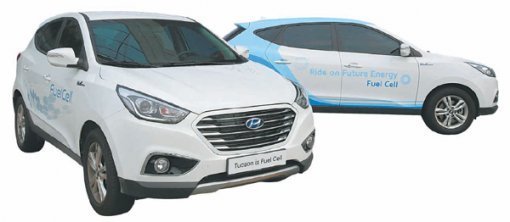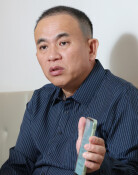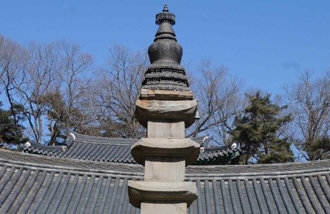Hyundai’s hydrogen powered taxis to hit the road
Hyundai’s hydrogen powered taxis to hit the road
Posted September. 13, 2016 07:29,
Updated September. 13, 2016 07:30

Hyundai has signed an MOU on Monday with the city of Ulsan and one of its taxi agencies to carry out the project. It has also agreed on an MOU with the city of Gwangju, Gwangju Creative Economy Innovation Center, J’ car, a start-up bred by the center, and Hyundai Venture Capital for a car sharing project. The taxi and the car-sharing service using hydrogen powered vehicles will be launched at the year-end in Ulsan and Gwangju, respectively.
Hydrogen powered cars are fueled by replenishing high-pressure hydrogen gas in the same way as regular petroleum powered cars, while other hybrid cars require charging of batteries at charging stations. Hydrogen fuel-cell cars generate their own power with the injected hydrogen gas using equipped power generators to charge the batteries.
The charging time for hydrogen powered models is only 3 minutes, far shorter than other hybrid models. They also travel longer distances when fully charged, up to more than 400 kilometers. “Regular hybrid models could travel only short distances per full charge, thus difficult to be used as cabs which travel long distances,” said an official from Hyundai. "Hydrogen powered models will be the best alternative.”
The hydrogen model that will be used for the pilot projects is Tucsan ix35, the maker’s sport utility model. Hyundai will provide 10 Tucsan ix35 vehicles for cabs in Ulsan, and add five more by the first half of next year, and another five in Gwangju.
The second phase in which the service will be expanded nationwide, is scheduled to start in the first half of the year 2018. Hyundai plans to provide a total of hundred hydrogen powered vehicles to be used in the taxi business in five regions in the term.
For the car sharing service in Gwangju, 15 of Tucsan ix35 fleet and regular electric model vehicles (IONIC Electric) will be on the roads by the year-end. The number is expected to be raised to 80 for each by 2018, and a total of 300 by 2020.
“We have selected Ulsan and Gwangju where Hyundai and Kia's manufacturing plants are located, so that follow-up services could be easier,” said the official. An industry expert interpreted Hyundai’s move as “making a headway for the next gen eco-friendly hydrogen cars, bypassing the electric cars.”
이은택 기자nabi@donga.com
Headline News
- N. Korea conducts ICBM test ahead of U.S. presidential election
- Samsung Electronics to expand 5th Gen HBM Sales in Q4
- Gov’t flags possible tax evasion among pension exemption applicants
- Draft of U.S.-brokered 60-day truce between Israel and Hezbollah leaked
- Half of working seniors earn less than 1 million won per month







